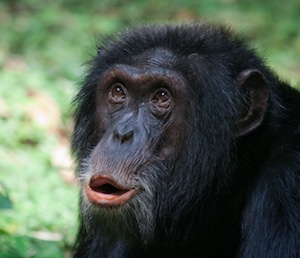
Chimps learn to share calls that refer to specific foods
Posted on 5 February 2015

New research led by scientists from the University of York and University of Zurich provides the first evidence that chimpanzees can ‘learn’ calls that refer to particular objects.
Chimpanzees give distinct grunts when they find different types of food, and other chimpanzees understand the meaning of those grunts. Previously, scientists have assumed that the pattern of sounds simply reflects the chimps' arousal - for example, their excitement about particular foods. This would imply that the sounds made by one chimp are uninfluenced by the sounds made by others. The new research challenges this long-standing assumption, and suggests that chimp vocalisations may have more in common with human language than was previously thought. The ability suggests that our shared common ancestor living over 6 million years ago may also have been socially learning referential vocalisations.
The new study was led by Dr Katie Slocombe from the Department of Psychology at York, and Dr Simon Townsend at the University of Zurich, and includes work carried out by York MRes student Stuart Watson for his project.
The team had a unique opportunity to investigate whether chimpanzees can change their food calls when a group of adult chimpanzees from Beekse Bergen Safari Park in the Netherlands were integrated with the resident chimpanzees at Edinburgh Zoo in 2010.
They found that that captive chimpanzees ‘learned’ grunts that refer to specific foods, and that when the previously separate groups of chimpanzees merged, the pattern of sounds made by the new arrivals became more similar to those of the resident group.
Dr Slocombe said: “An extraordinary feature of human language is our ability to reference external objects and events with socially learned symbols, or words. These data represent the first evidence of non-human animals actively modifying and socially learning the structure of a meaningful referential vocalisation.”
“Our findings indicate that primate referential call structure is not simply determined by arousal, and that the socially learnt nature of referential words in humans is likely to have ancient evolutionary origins.”
Dr Simon Townsend, of the University of Zurich, added: “These findings might shed some light on the evolutionary origins of these abilities. The fact that both humans and now chimpanzees possess this basic ability suggests that our shared common ancestor living over 6 million years ago may also have been socially learning referential vocalisations”.
Here is the story featured on BBC News and CBBC Newsround.
You can find more information in the report on Vocal Learning in the Functionally Referential Food Grunts of Chimpanzees.
